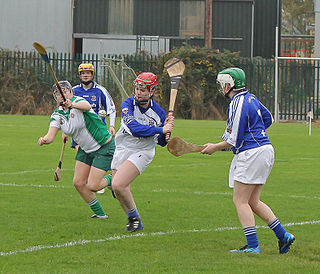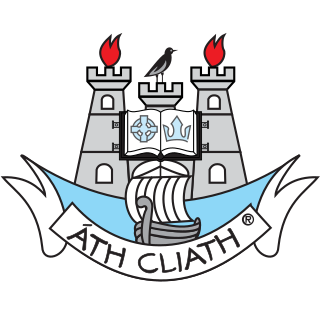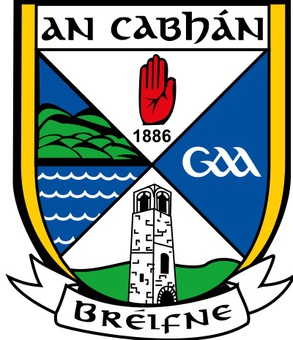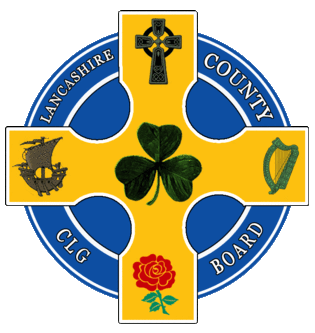
Gaelic football, commonly known as simply Gaelic, GAA or Football is an Irish team sport. It is played between two teams of 15 players on a rectangular grass pitch. The objective of the sport is to score by kicking or punching the ball into the other team's goals or between two upright posts above the goals and over a crossbar 2.5 metres above the ground.

Camogie is an Irish stick-and-ball team sport played by women. Camogie is played by 100,000 women in Ireland and worldwide, largely among Irish communities.

The Gaelic Athletic Association is an Irish international amateur sporting and cultural organisation, focused primarily on promoting indigenous Gaelic games and pastimes, which include the traditional Irish sports of hurling, camogie, Gaelic football, Gaelic handball and rounders. The association also promotes Irish music and dance, as well as the Irish language.

The National Football League is an annual Gaelic football competition between the senior county teams of Ireland plus London. Sponsored by Allianz, it is officially known as the Allianz National Football League.

The Dublin County Board of the Gaelic Athletic Association (GAA) or Dublin GAA is one of the 32 county boards of the GAA in Ireland, and is responsible for Gaelic games in the Dublin Region and the Dublin county teams. The teams and their fans are known as "The Dubs" or "Boys in Blue". The fans have a special affiliation with the Hill 16 end of Croke Park.

The Cavan County Board or Cavan GAA is one of the 32 county boards of the Gaelic Athletic Association (GAA) in Ireland, and is responsible for the administration of Gaelic games in County Cavan.

The Waterford County Board of the Gaelic Athletic Association (GAA) or Waterford GAA is one of the 32 county boards of the GAA in Ireland, and is responsible for all levels of Gaelic games in County Waterford. The County Board is also responsible for the Waterford county teams. The county board's offices are based at Walsh Park in the city of Waterford. The Waterford County Board was founded in 1886.

The Louth County Board of the Gaelic Athletic Association (GAA) or Louth GAA is one of the 32 county boards of the GAA in Ireland, and is responsible for Gaelic games in County Louth. The county board is also responsible for the Louth county teams.

The GAA Interprovincial Championship or Railway Cup is the name of two annual Gaelic football and hurling competitions held between the provinces of Ireland. The Connacht, Leinster, Munster and Ulster GAA teams are composed of the best players from the counties in each province. The games are organised by the Gaelic Athletic Association.

Australian rules football in New South Wales is the team sport as played and observed in the Australian state. It dates back to the colonial era in 1866 with organised competition being continuous since the 1880s. Today, in several regions of the state, it is moderately popular, including areas near the Victorian and South Australian borders such as the Riverina, Broken Hill, and South Coast. Elsewhere, and particularly in Sydney, Rugby league and Soccer are more popular. These areas form part of an Australian cultural divide described as the Barassi Line. To the east of the line it is known as "AFL" after the elite Australian Football League competition. AFL NSW/ACT is the governing body and includes the Australian Capital Territory.
Greg Brentnall is an Australian former rugby league footballer who played in the 1970s and 1980s. An Australian international and New South Wales representative fullback and wing, he played for Canterbury-Bankstown in the New South Wales Rugby League premiership, winning the 1980 grand final with them.

The Dr McKenna Cup is an annual Gaelic football competition played between counties and universities in the province of Ulster. It is the secondary Gaelic football competition based in Ulster behind the Ulster Senior Football Championship, and the fourth most important inter-county competition in which Ulster counties take part, behind the All-Ireland Senior Football Championship, the Ulster Championship and the National Football League.
The International Rules Series is a senior men's international rules football competition between the Australia international rules football team and the Ireland international rules football team.

The S. G. Ball Cup is a junior rugby league football competition played predominantly in New South Wales, between teams made up of players aged under 19. Teams from Canberra and Melbourne also participate. Prior to the COVID-19 pandemic in New South Wales teams from Perth and Auckland also participated. The competition is administered by the New South Wales Rugby League. The competition includes both junior representative teams of NRL and NSW Cup clubs that do not field a team in the NRL competition.

The Lancashire County Board of the Gaelic Athletic Association (GAA), or Lancashire GAA, is one of the county boards outside Ireland and is responsible for the running of Gaelic games in the North West of England and on the Isle of Man. With Scotland, Warwickshire, Gloucestershire, Hertfordshire, London and Yorkshire, the board makes up the British Provincial Board. The Lancashire board oversees the Lancashire Junior Championship, the Lancashire Junior League, and the first and second division of the Pennine League.
The Australasia County Board of the Gaelic Athletic Association (GAA), or Australasian GAA, or Gaelic Football & Hurling Association of Australasia is one of the county boards of the GAA outside Ireland, and is responsible for Gaelic games all across Australasia. It is also responsible for Australasian inter-state matches, primarily conducted in an annual weeklong tournament. The association is made up of the Australian state associations of New South Wales, Queensland, South Australia, Tasmania, Victoria and Western Australia, and the New Zealand associations of Wellington and Canterbury.
The Victorian Ice Hockey Association, currently trading as Ice Hockey Victoria is the governing body of ice hockey in Victoria, Australia. The Victorian Ice Hockey Association is a branch of Ice Hockey Australia.

As with other sports, the COVID-19 pandemic caused disruption to Gaelic games, primarily in Ireland but also elsewhere in the world. Competitions were cancelled, postponed or restructured, while some teams were withdrawn or were unable to participate in those competitions that went ahead.














